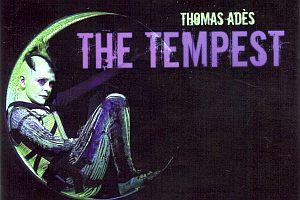Chromatic gales, emotion-churning dissonances, and vocal writing so torturous it makes you wonder whether the all-star cast is composed of masochists: Such is the score for Thomas Adès’ three-act opera, The Tempest. Commissioned by the Royal Opera Covent Garden, where it was premiered in February 2004 under the then-32-year-old British composer’s baton, the eerie opera has since been performed in Strasburg, Copenhagen, and Santa Fe.
Before it reaches Frankfurt in 2010 and the Met in 2012, you can hear Adès’ and Meredith Oakes’ setting of Shakespeare’s Tempest in this live, two-CD set from EMI Classics. Captured at the Royal Opera House in March 2007, the cast includes many of the same principals who risked vocal ruin at the premiere.
How to describe this anything-but-easy-listening wild ride? It certainly has its share of arias, not least the Act 3 quintet, and the spirit Ariel’s amazing Act 1 coloratura tour de force, “Five fathoms deep.” You cannot possibly understand the words of the latter aria, as sung by Cynthia Sieden, without consulting the libretto. Sounding at times like a ridiculously high-pitched Florence Foster Jenkins who somehow manages to sing on key, Sieden’s squeaks may lead you to wonder what she sounded like before she assumed the role. One thing is certain: Joan Sutherland would never have attempted such a part. Even the daring Beverly Sills, who risked singing the original version of Zerbinetta’s aria from Strauss’ Ariadne auf Naxos, might have preferred to skydive off the Empire State Building.
The list of principals, including Simon Keenlyside (Prospero), Ian Bostridge (Caliban), Kate Royal (Miranda), Toby Spence (Ferdinand), and Philip Langridge (King of Naples), reads like a who’s who of contemporary English vocalism. No one is flattered by the writing’s wild leaps, save for the pure-voiced Spence. But that is not the point. Adès seems determined to portray the outer tempest as a projection of inner torment, and struggle is the order of the day. We listeners may initially struggle, as well, but once we get the hang of what Adès is doing, his insights into character ring with eloquence. Certainly, assigning the roles of the drunken scum, Stefano (Stephen Richardson) and Trinculo (David Cordier), to a deep bass and a hooting countertenor, gives us the yang and yin of treachery.
Perhaps everyone would have sounded better if the recording quality were even average. I don’t know what happened, but a hint of high frequency squeal halfway through the opera, along with lots of background noise when mikes are turned up for the Royal Opera Chorus, suggests that the engineers finagled royally to make the recording acceptable.
Thankfully, even though colors are washed out, the music’s emotional impact remains. In that sense, The Tempest offers a window on state-of-the-art English opera in the new millennium. Perhaps if the planet were in a less dire state, Adès’ music would sound more like Puccini’s. But the world of La Rondine survives only onstage and in the parallel universe of the super-rich. The Tempest is far more about what we’ve become. As Shakespeare suggests, only the redemptive power of love offers hope for transcendence.

